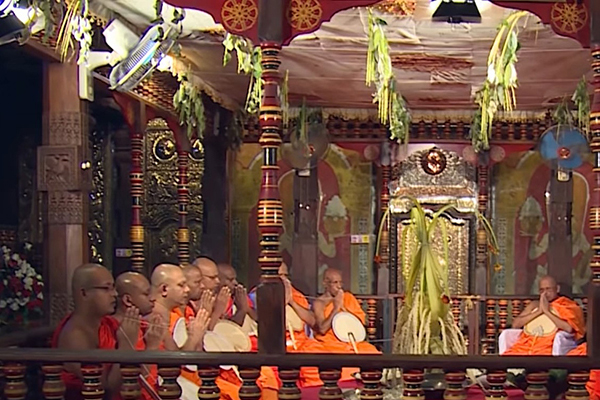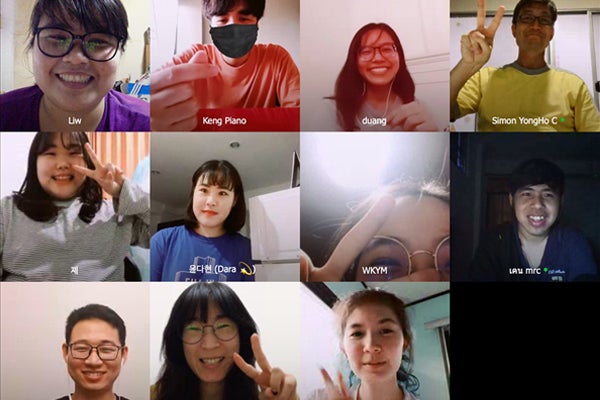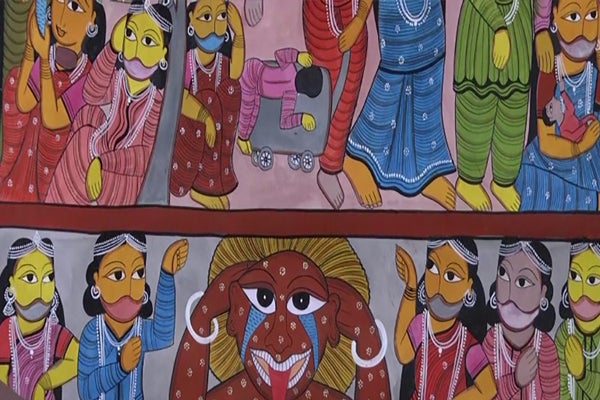Commercialization and Transformation of Buddhist Temples in Thailand during the COVID-19 Pandemic
contributed by Yunkang Liu, 10 June 2021
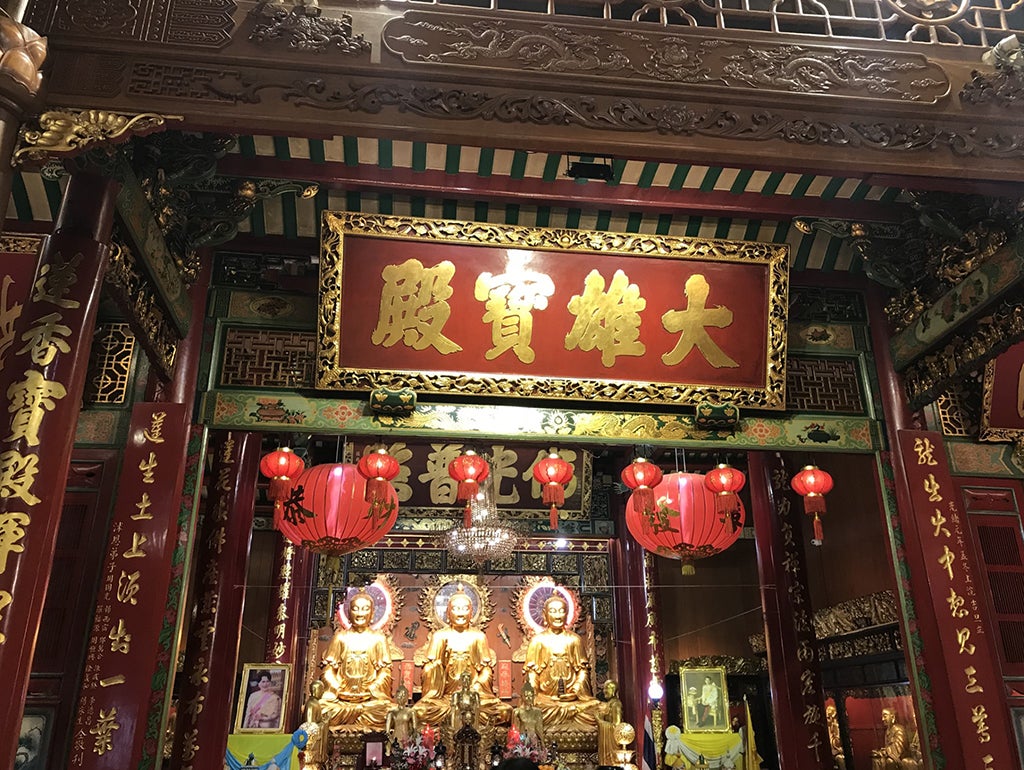
Cover image: The main altar of Wat Mangkon Kamalawat in Bangkok, Thailand. (Photo taken by the author)
The global COVID-19 pandemic is a major public health crisis that has significantly impacted many countries economically and socially - economic depression, rising poverty, and social instability have accelerated. The everyday lives of people, traditional Buddhist ritual practices, and temple operations have also been affected, although the COVID-19 situation in many Southeast Asian countries has improved with the launch of new regulations which generally encourage citizens to work from home and avoid large events.
Buddhist temples in Thailand are typically visited not only by local worshippers, but also attract a large number of foreign worshippers. As such, the Tourism Authority of Thailand (TAT) supports religious-based tourism development (e.g. the WAT project: ‘Worship Activities Tradition’ initiative) to attract Buddhist devotees from domestic and overseas, and contribute to economic diversity in the tourism industry. At the same time, this kind of change has also accelerated the transformation of Buddhist temples and religion-related sector operations.
Thai Buddha amulets are produced to collect and raise funds for a temple’s daily operations. These amulets are often made in the form of a small Buddha statue, small Buddhist stupa, or a representation of famous Buddhist monks by using different materials (as shown in Figure 1).

Figure 1 and 2. (left) One type of Buddha amulets for strengthening against COVID-19 transmission. (Photo taken from Posttoday). (right) The Tha Prachan amulet market in Bangkok, Thailand. (Photo taken from Thai PBS)
Within the Theravada Buddhists context, Buddhists believe these Buddha amulets can help improve their luck and good fortune. People can obtain a Buddha amulet from the monk by simply donating to the temples. Nowadays, with the growth in demand for high-value amulets, some Buddha amulets are also being traded in local amulet markets (as shown in Figure 2). Generally, local Buddhist devotees use amulets to improve their wealth, relationships, and to avoid accidents. Due to the global COVID-19 pandemic, the Buddhist devotees are not only seeking Buddha amulets related to wealth or love, but also health-related Buddha amulets which they hope can protect their health from the pandemic. For example, a taxi driver in Bangkok collects and prays to the amulets, because he believes that these amulets can fight the COVID-19 virus and improve his health.
Another example is a poster from a Thai Buddhist temple on social media, which shows a face mask inscribed with spiritual incantations (as shown in Figure 3 and 4). Buddhists believe that spiritual incantations can better protect them from the COVID-19 virus. From a market perspective, the diversity of worshippers' demands also promotes the transformation of the Buddhist brand-related industry.
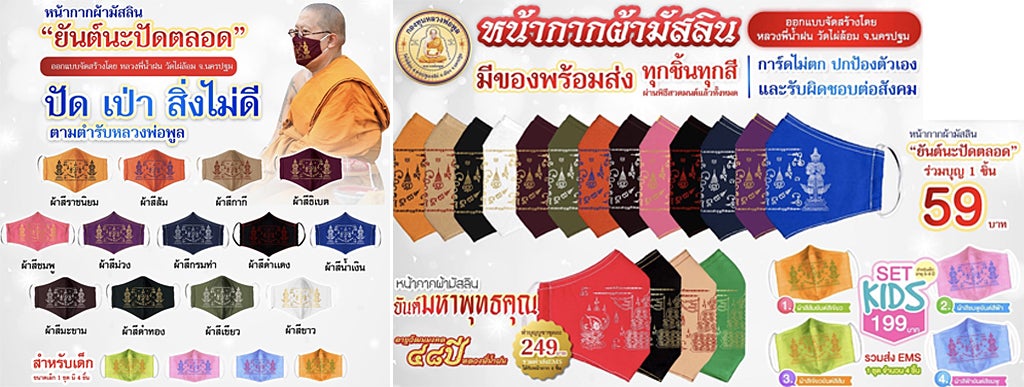
Figure 3 and 4. (left) Varieties of face masks inscribed with spiritual incantations. (right) Prices of face masks. (Photo taken from the Facebook page of Wat Phai Lom)
Due to the effect of the COVID-19 pandemic, many countries in Southeast Asia have implemented a regional travel ban, mandatory quarantine, and other measures, resulting in a significant reduction of international tourists in Thailand. In view of the situation, Buddhist devotees from overseas are trying to find other alternative ways of worship - with some shifting to online platforms, or through agencies. For example, some individuals and agents who pursue the profits of the religious industry have developed a “Help You Worship" package to meet the demand of overseas worshippers who are unable to travel (as shown in Figure 5). The proxy worship service of “Wat Mangkon Kamalawat” and “Wat Borom Racha Kanjanapisek Anusorn” in Bangkok are the cases in point.
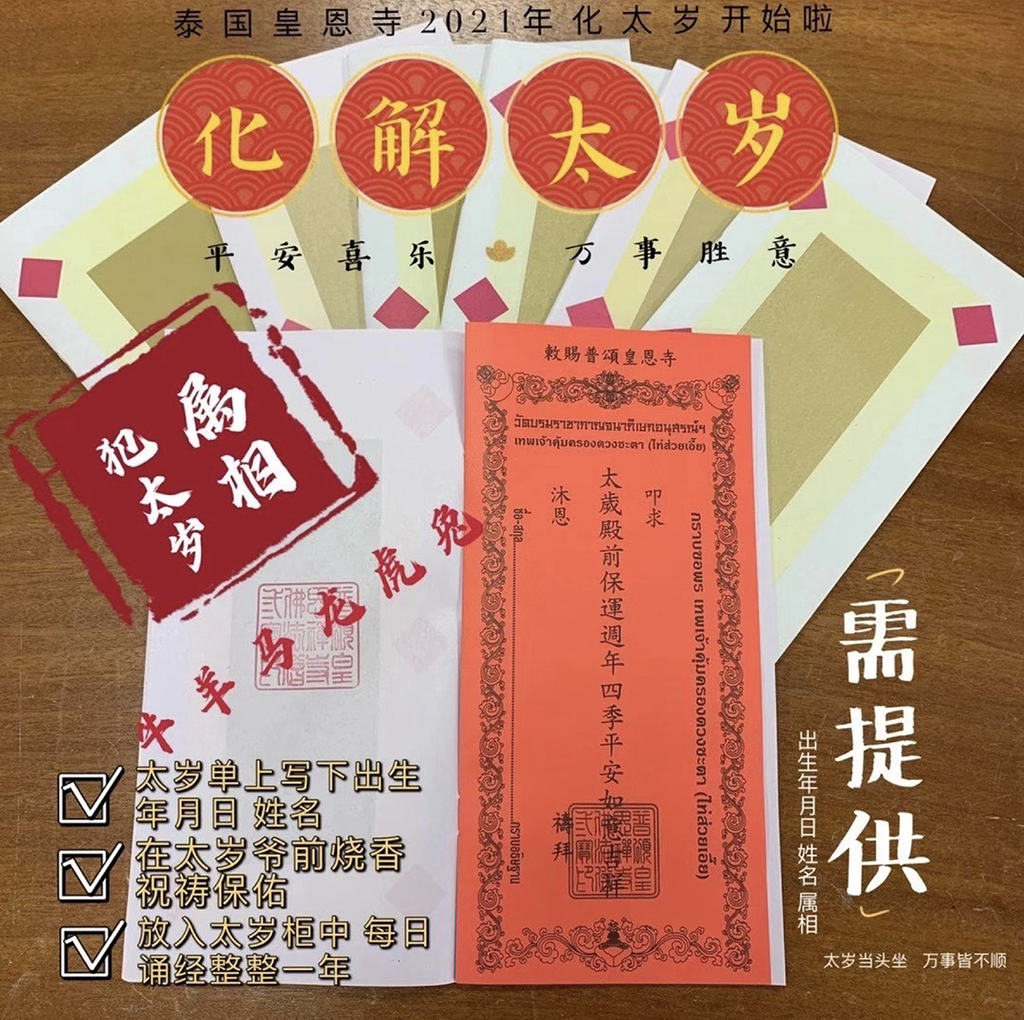
Figure 5. The agent’s advertising of “Help You Worship” service - Hua Tai Sui (化太岁). (Photo taken from Wechat page of the agents)
One of the most popular services is “Hua Tai Sui” (化太岁), which is based on the traditional Chinese zodiac, a cycle of twelve years where each year is represented by an animal sign and its attributes. “Pee Chong” (Thai word: ปีชง) means the cursed year. The word ‘Pee/ ปี’ refers to ‘Year’, and ‘Chong/ชง’, stands for conflict. According to traditional Chinese Zodiac beliefs, people will experience “Pee Chong” if their respective zodiac sign is in conflict with “Tai Sui” (太岁) (the Chinese deity in charge of people's destiny). These Chinese beliefs have been infused with Thai religion and culture, and grant blessings to Thai-Chinese communities and a large number of tourists in Thailand. Under the Chinese traditional concepts of “Tai Sui” (太岁), four zodiac signs will have bad luck each year based on ancient astrology. For 2021, which is the Year of the Ox, worshippers believed that those who were born in the Year of the Ox will have bad luck because they offended “Tai Sui” (太岁). Similarly, those who were born in the years of the Dragon, Goat, and Dog will also experience different types of misfortune. To avoid bad luck (e.g. pandemic impact on employment and business), or reducing the chances of getting infected with COVID-19, worshippers will spend around 100 Baht to go “Hua Tai Sui” (化太岁). Basically, there are five steps of “Hua Tai Sui'' (化太岁) in Thailand. This includes writing the individual’s name and date of birth on a piece of red paper, praying to “Tai Sui” (太岁), burning incense sticks, shaking the red paper from up to down, and lastly depositing the red paper in an assigned area.
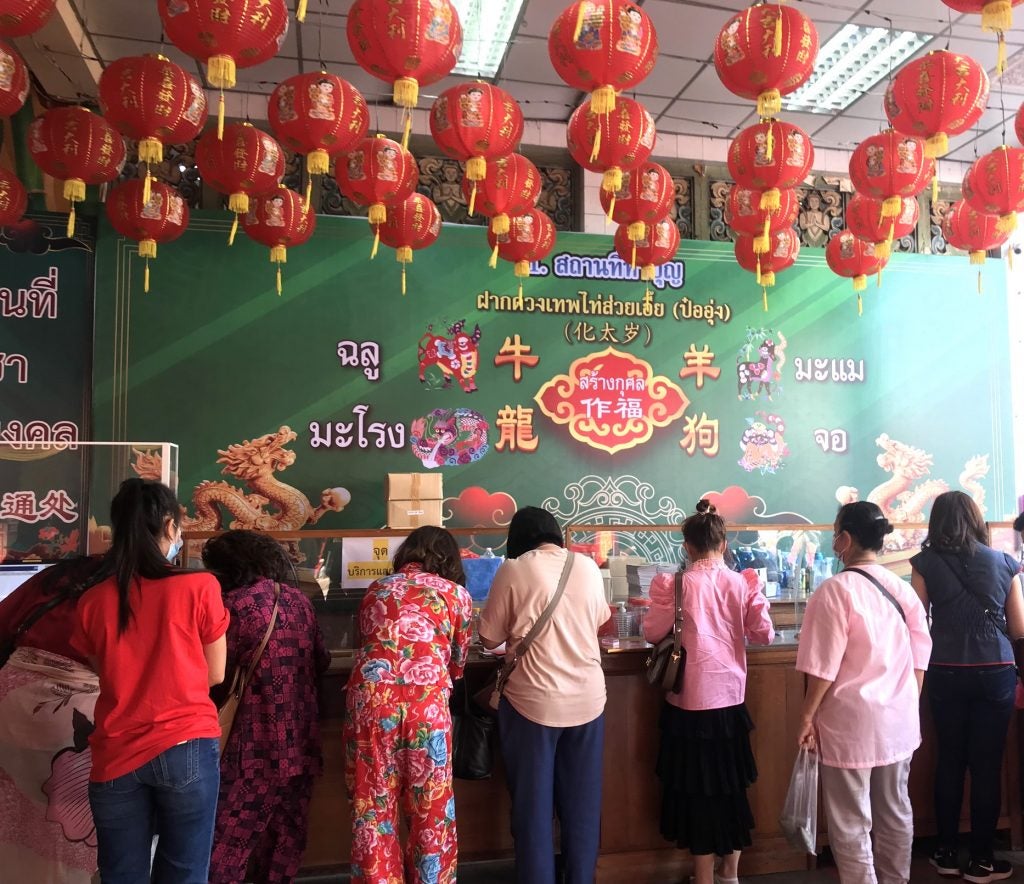
Figure 6. The local worshippers writing their personal information on a piece of red paper, before praying to “Tai Sui” (太岁). (Photo taken by the author in February, 2021)
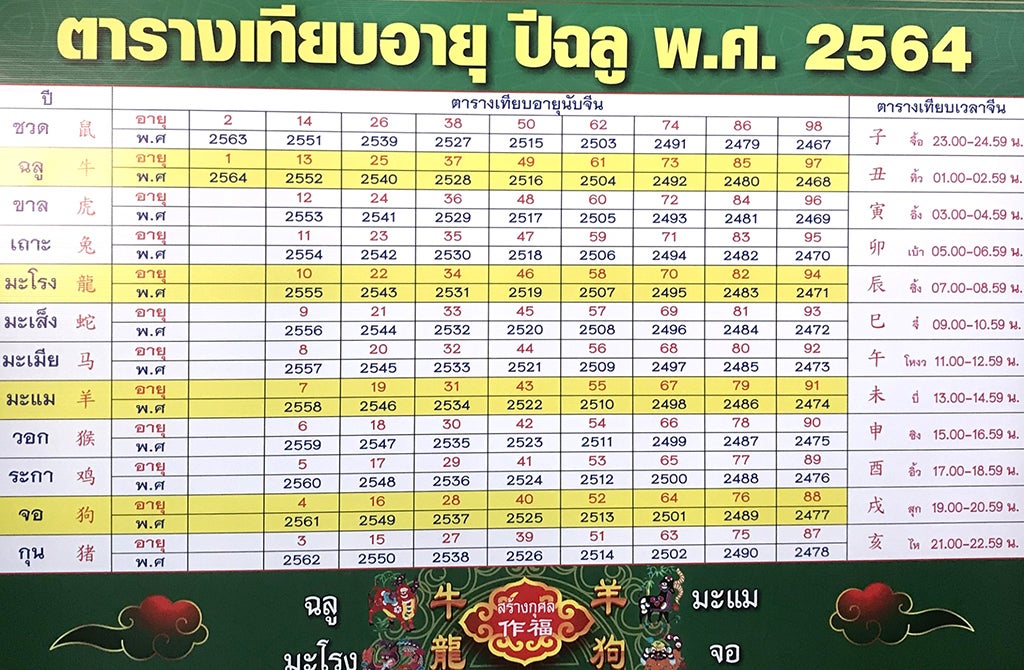
Figure 7. The four zodiacs (ox, dragon, goat and dog) highlighted in yellow are astrologically susceptible to bad luck in 2021. (Photo taken by the author in February, 2021)
Among overseas worshippers, there is a large demand for the “Hua Tai Sui” (化太岁) service from Chinese Buddhists. Agents mainly push proxy worship advertising through social media platforms commonly used by Chinese customers, such as WeChat and Weibo, to gain the attention of Chinese worshippers. Usually, before the agent goes to the temple, the worshippers will send their name, date of birth, and other personal information to the agent in Bangkok, and pay a certain amount of service fees. Due to the impact of the COVID-19 pandemic, the number of local and overseas worshippers visiting temples has decreased. For overseas worshippers, travel is difficult, costly, risky, and in some cases, simply impossible. To maintain their faith without being able to physically worship at the temple, overseas devotees pay for agents to help them go through the five steps of “Hua Tai Sui'' (化太岁) in temples. At the same time, the potential and profitability of religion-based business has contributed to a rise in the development of the proxy worship industry, as well as changed the worship model of Buddhists overseas.

Figure 8. The piece of red paper for recording the name and date of birth. (Photo taken by the author in February, 2021)
However, it is necessary to rethink whether temples and religious worship activities should be commercialized, and how the religious and commercial value chain influences the process of anti-COVID-19 pandemic in worshipper communities. Or perhaps consider what will be the long and short-term impacts of commercialization on temple operations and religious development? From a commercial perspective, the COVID-19 pandemic may promote the creation of new business opportunities for agents in the religion-related industry, and the provision of such proxy worship service has enabled continuity in religious practice for Buddhists overseas. For temples, there is also an opportunity to spread Buddhism indirectly, raise funds and continue rituals by creating a value chain of proxy worship despite the impact of the pandemic. In general, this seems like a "Win-Win-Win'' operation model during the pandemic. However, some critics also argue that the commercialization of religious activities is a way to the desecration of religion, and excessive commercialization and capital influence will affect the “sanctity” of local temples and the “purity” of Buddhism. Perhaps, the Department of Religious Affairs, as well as local religion research institutes can pay more attention to the operation and "good" governance studies of the Buddhist industry in the post-pandemic era. In this way, religions and religion-related industries will be able to develop more rationally, sustainably, and inclusively in modern society.
Disclaimer: The views and opinions expressed in this article are those of the authors and do not necessarily reflect the position of the blog editorial team or the Asia Research Institute.
South Asia | Southeast Asia | East Asia | Other Places | Hinduism | Buddhism | Islam | Christianity | Other Religions
Yunkang Liu obtained a Master of Arts in International Development Studies from the Faculty of Political Sciences, Chulalongkorn University, and a MBA degree in Asia-Pacific Business from NIDA Business School. Beyond that, he was selected as a youth delegate for several international summits and regional dialogues. Currently, he is a teaching assistant at Chulalongkorn School of Integrated Innovation. His research interests are the comparative study of business and development issues in Southeast Asia and East Asia.
Other Interesting Topics
Sonic Fields of Protection in Sri Lanka’s COVID-19 Pandemic
In this reflection on Buddhism and COVID-19, two anthropologists, Nalika Gajaweera and Neena Mahadev, explore the apotropaic practices of ritual chanting by Theravāda Buddhist monastics for protection against COVID-19 in Sri Lanka. The authors also engage a discussion of how Sinhala notions of national security (rata arakśawa kirīma) and practices of securitization are being extended beyond the domain of spiritually protective Dharmic energies to guard against the viral contagion....
The Impact and Challenges of the COVID-19 Pandemic on Christianity in Thailand
Since the global outbreak of COVID-19 at the end of 2019, Thailand has experienced two peaks of the pandemic. Changing social behaviour in order to curb the outbreak has also deeply affected the religious field. Christianity currently has adherents who represent 1.2% of the total population in Thailand...
Coronasur, Folk Epistemologies, and the Pandemic
Foucault’s conceptual framework of long history seeks to understand change in terms of movements of slow accumulation and dissipation, as a rhythmic cycle of checks and balances. This slow movement of “material civilization,” where the concept of a rupture or discontinuity...


